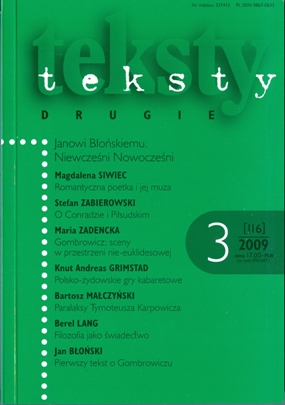Do granic. Olga Tokarczuk i Władysław Strzemiński
Up to the Limits. Olga Tokarczuk and Władysław Strzemiński
Author(s): Wojciech BałusSubject(s): Literary Texts
Published by: Instytut Badań Literackich Polskiej Akademii Nauk
Keywords: Olga Tokarczuk; Władysław Strzemiński; Contemporary Polish Literature; Postmodernism.
Summary/Abstract: In chapter 1 of Olga Tokarczuk’s novel Bieguni, as well as in Władysław Strzemiński’s concept of unism in painting, the axis of considerations is a tension between what is singular, individual, and the totality of impersonal being. In his theory of unism, Strzemiński expressed a modernist experience that revolved around modern aspects of reality being built by man. His focus was reasonability of the modern world and its technological organisation as well as a determinable pure essence of individual artistic genres. For Tokarczuk, the life of post-modern man is spread between impersonality of objectified being and incessant journey through non-places (railway stations, airports, hotels) – a journey that somehow builds the existence but this existence is shredded in the manner the novel Bieguni is itself fragmentary and non-continuous. Impersonal being is a threat, much in the manner the il-y-a is for Lévinas; restless existence becomes, in turn, a rescue inasmuch as eternal elopement of man before the murmur of thickening stagnation. Regardless of the differences between the two authors in question, both have expressed the same conviction. Namely, if one is willing to touch something common, a form of being is reached for which is an undifferentiated, continual and impersonal being.
Journal: Teksty Drugie
- Issue Year: 2009
- Issue No: 3
- Page Range: 103-120
- Page Count: 18
- Language: Polish

